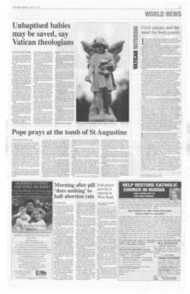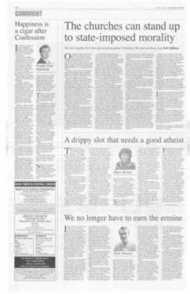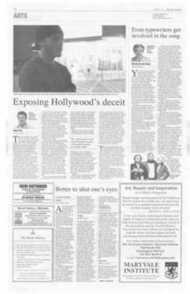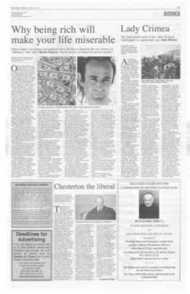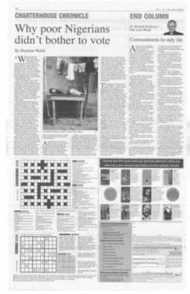Page 12, 27th April 2007
Page 12

Report an error
Noticed an error on this page?If you've noticed an error in this article please click here to report it.
Tags
Share
Related articles
Atheistic Intruders
Radio 4 Under Fire For Sunday Shake-up
Priests For Religious Affairs Slot
Lavinia Byrne Sacked By The Bbc
Christian Bus Driver Walks Out In Advert Protest
A drippy slot that needs a good atheist
Mary Kenny
There is currently a battle going on for the soul of "Thought for the Day-, the prestigious religious spot on BBC Radio 4 each morning at 7.45.
There's a vigorous campaign by secularists and atheists to be allowed to make their contribution to the slot. They allege that limiting the broadcast to religious speakers is discriminatory. and does not reflect the composition of the country in which there is a substantial minority of nonbelievers.
They claim that secularists and atheists are just as capable as religious people of composing a thoughtful and meaningful reflection on life.
So far the BBC has kept the secularists at bay, and the official policy is maintained that this broadcast is specifically religious. and is only two minutes in 24 hours.
Well, quite. Two minutes in a day isn't a great deal for religion. So that, having paid their token obeisance to religion — which is, by the way, "by law established" in the United Kingdom — they can then go on to be hostile to faith values for the rest of the time, as, for example, virtually all their arts and comment programmes are.
Paradoxically, I side with the secularists on this. "Thought for the Day" should be opened up to people of no faith. First, because it would remove the fig leaf that is currently maintained over faith issues. And second, it might actually spice up the broadcasts themselves, which are often lamentable.
There are gifted regular contributors , such as Anne Atkins and Lionel Blue, but for the most part, when you switch on "Thought for the Day" you get that irksome parsonical voice murmuring banalities.
Most of the scripts are dripping wet, with soppy messages so inoffensive they have little meaning beyond the confines of a sentimental greetings card. For the most part the texts are loaded with political correctness and larded with timid generalisations.
An astringent secularist might buck up the content of the religious contributions. Might sting the faith talkers into actually defending faith with a bit of vigour: might stimulate them into competing with a bit of conviction.
As it is, "Thought for the Day" is a protected monopoly flaccid with received ideas, and mired in the cowardice of, above all, never offending anyone. The secularists' call for change is, mayhap. God's way of telling the producers to liven up their act.
Some of the Most interesting discussions I recall from my schooldays concerned Limbo. We were told that unbaptised babies were despatched to Limbo. But so were pre-Christian Greek philosophers, such as Aristotle, who had led good lives. So, although it was a place separated from God's love, it was not a place of suffering and the companionship might be quite interesting.
Now, it seems that Limbo has been abolished. Indeed, the orthodox view is that it was never really established at all. In 1984, the then Cardinal Ratzinger said that "the doctrine of Limbo has never been a definitive truth of the faith but merely a theological hypothesis".
Limbo does not appear in Dante's Divine Comedy. There is something called "the third circle", which is assumed to be a kind of Limbo, but it is never named as such.
The concept of Limbo has entered the language rather usefully. We know exactly what we mean by someone being "in Limbo": they are awaiting in some vague anteroom of category.
We shall miss Limbo as a linguistic idea. Francois Bayrou, the centre candidate in the French presidential election — with over 18 per cent of the votes in the first round — is a devout Catholic. He is also a farmer, has worked as a history teacher, and published a biography of Henri IV. the Navarre king. M Bayrou is also the father of six children, and the family is still based on the family farm in the Beam region, not far from Lourdes.
Although he won't be president, his voters hold the balance as between the two contenders in the final round, Nicholas Sarkozy and Segolene Royal.
Will ''Sarkoor "Sego" court that Catholic vote which is still on deposit in traditional France? Politicians will do anything to gain power, so presumably, yes.
It was said, of the English Civil War, that one side was "right but repulsive", while the other was "wrong but romantic", and that pretty well describes Sarko and Sego for me. Still, you have to hand it to the French: they run an election with their customary style.
www.mary"-kenny.com
blog comments powered by Disqus






